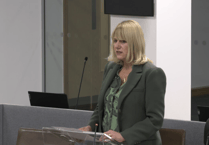Wales’ universities are being battered and bruised from every angle, a Mid and West Wales MS has warned, as Aberystwyth University faces a funding cut of more than £1m.
Cefin Campbell told the Senedd the greatest burden will fall on students, with a reduction in services, as he warned a further tuition fee increase may be inevitable.
The Plaid Cymru politician raised concerns about the Higher Education Funding Council for Wales’ (Hefcw) funding allocations which were announced on Tuesday.
He said Aberystwyth University faces a reduction of £1.1m; Swansea University, £2.4m; Cardiff, £3.7m; Bangor, £600,000; and Trinity St David's, £800,000.
During education questions on 10 July Mr Campbell said: “These cuts will force universities to make difficult decisions, potentially leading to staff redundancies.”
The shadow education secretary raised the risk of losing “vital” academic programmes and research initiatives, which contribute to the economy and wider society.
Mr Campbell said: “The risk is that we will see more job losses happening.
“Already, universities have talked about redundancies, both voluntary and compulsory.
“Aberystwyth spoke recently about the loss of some 200 jobs and Swansea around 190 jobs.
“No university wants to take these decisions but, in terms of the continued viability of these universities for the future, they have no other choice.”
The former lecturer accused the Welsh Government of being short sighted in its approach to higher education.
Education Secretary Lynne Neagle said the Welsh Government funding provided via Hefcw – the arm’s-length body which will be replaced in August – is barely 10 per cent of the total.
She said: “The challenges that they're facing are due to a range of factors, such as overseas student funding, changes in commercial revenues and research income.”
Ms Neagle acknowledged the challenging financial constraints faced by higher education institutions – “not just in Wales but across the UK”.
The education secretary, who was appointed in May, explained that universities have been impacted by changes to student visas and inflationary pressures.
She said: “The whole approach to immigration of the previous UK Government and the very unwelcoming climate that has been created have had an impact, a major impact.”
Ms Neagle told the chamber that universities also took a “big hit” on European funds.
“I do recognise the pressures that they're under,” she reiterated.
“That was also one of the reasons why we agreed to the increase in student fees to £9,250.”





Comments
This article has no comments yet. Be the first to leave a comment.